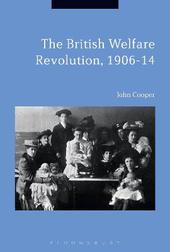
|
The British Welfare Revolution, 1906-14
Paperback / softback
Main Details
| Title |
The British Welfare Revolution, 1906-14
|
| Authors and Contributors |
By (author) John Cooper
|
| Physical Properties |
| Format:Paperback / softback | | Pages:368 | | Dimensions(mm): Height 234,Width 156 |
|
| Category/Genre | British and Irish History |
|---|
| ISBN/Barcode |
9781350109179
|
| Classifications | Dewey:361.94109041 |
|---|
| Audience | | Tertiary Education (US: College) | |
|---|
|
Publishing Details |
| Publisher |
Bloomsbury Publishing PLC
|
| Imprint |
Bloomsbury Academic
|
| Publication Date |
18 April 2019 |
| Publication Country |
United Kingdom
|
Description
The Welfare Revolution of the early 20th century did not start with Clement Attlee's Labour governments of 1945 to 1951 but had its origins in the Liberal government of forty years earlier. The British Welfare Revolution, 1906-14 offers a fresh perspective on the social reforms introduced by these Liberal governments in the years 1906 to 1914. Reforms conceived during this time created the foundations of the Welfare State and transformed modern Britain; they touched every major area of social policy, from school meals to pensions, the minimum wage to the health service. Cooper uses an innovative approach, the concept of the Counter-Elite, to explain the emergence of the New Liberalism and examines the research that was carried out to devise ways to meet each specific social problem facing Britain in the early 20th century. For example, a group of businessmen, including Booth and Rowntree, invented the poverty survey to pinpoint those living below the poverty line and encouraged a new generation of sociologists. This comprehensive single volume survey presents a new critical angle on the origins of the British welfare state and is an original analysis of the reforms and the leading personalities of the Liberal governments from the late Edwardian period to the advent of the First World War.
Author Biography
John Cooper is a social historian, specialising in Jewish history and the British history of the Edwardian period, and author of several books. He has written books on Jewish food, Jewish childhood, Jewish professionals and biographies of Raphael Lemkin and the first Lord Rothschild. He is a Fellow of the Royal Historical Society.
ReviewsCooper has made an important contribution to a well-covered field by treating the many social welfare reforms of this brief period in a single book. The chronological structure he adopts and the attention he gives the historical actors involved make this a book that general readers and undergraduates will find particularly valuable. * Journal of Modern History * The British Welfare Revolution, 1906-1914 is a thorough and deeply knowledgeable analysis of the foundations of the welfare state laid down by the Liberal government before the First World War. It is a most valuable contribution to British history and will prove indispensable to the serious student. * Vernon Bogdanor, Professor of Government, King's College, London * Cooper concludes that this Edwardian welfare revolution was the bedrock of Britain's welfare state following WWII, and still permeates British society today. Summing Up: Recommended. All levels/libraries. * CHOICE *
|